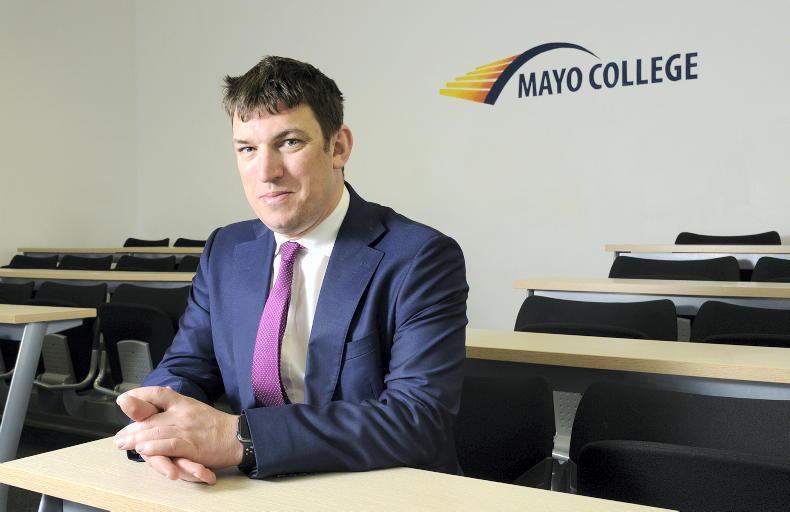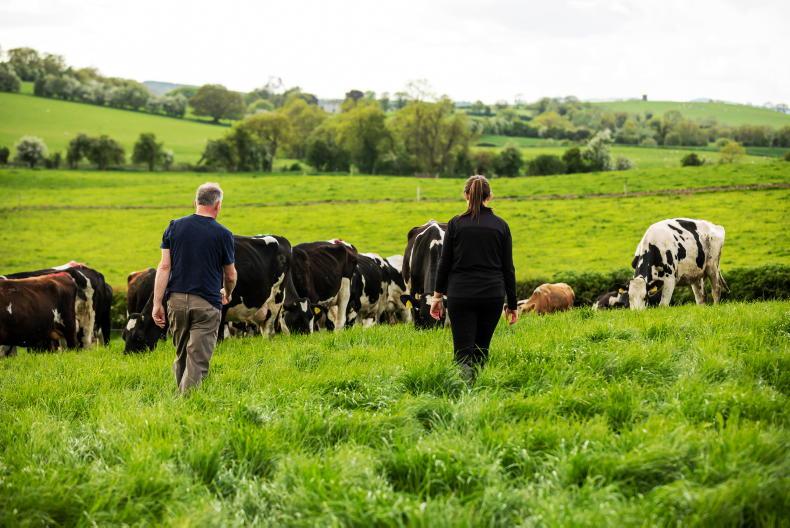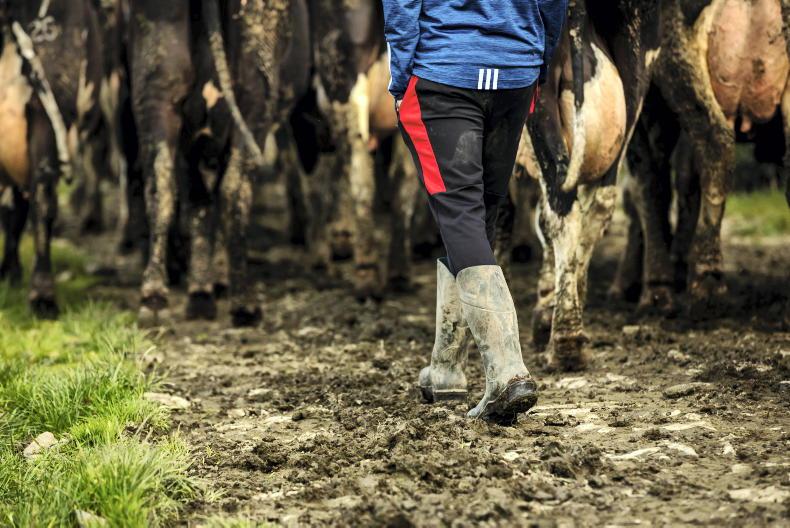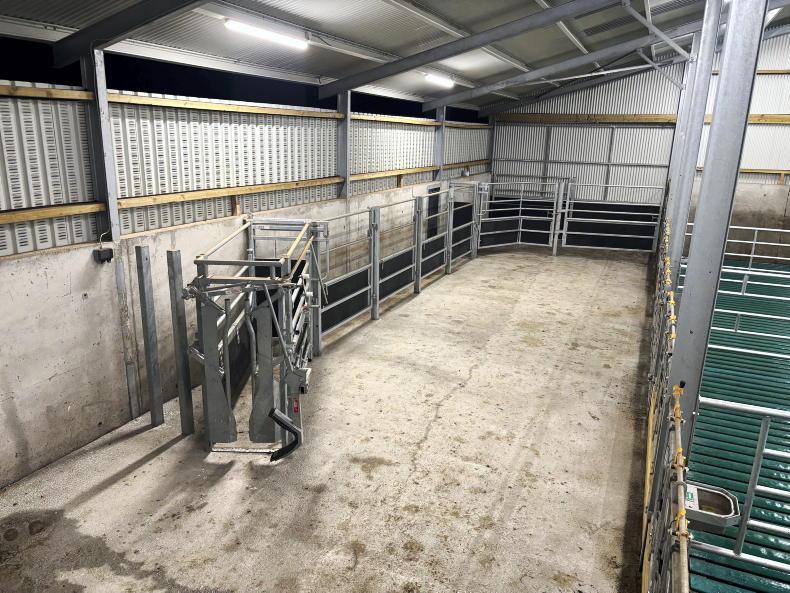Applications for Green Cert courses opened in colleges around the country in recent weeks, and anecdotal evidence suggests that overall numbers should hold at close to last year’s levels.
That is certainly the view of Michael Murphy, principal at the Mayo College of Further Education and Training.
“We have around 200 applicants to date,” says Murphy of the college’s part-time online Green Cert course.
Murphy has an obvious grá for the online course, which has been running since 2013.
Indeed, the manner in which the course came about is testament to the Mayo-man’s dedication to agri-training and his innovative approach to education.
Contacted by the development co-op on Clare Island with a view to delivering a Green Cert course for a number of young local farmers, Murphy agreed but was struggling with the logistics.
Getting the farmers to the Westport College of Further Education, where Murphy was principal at the time, was not really feasible given the times of the ferries from the island. There was also the risk that students could be left stranded on the mainland in bad weather.
Bringing the classes out to Clare Island was not really an option either; as all the same risks were in play – except in reverse. Instead of having students stuck on the pier at Roonagh, you could have had teachers stranded on the island.
The answer to the problem was to live-stream the classes; an option that was facilitated by an upgrade of Clare Island’s internet service.
This innovative move proved hugely popular not only with the young farmers on Clare Island but also with applicants around Ireland and beyond.
“We had 20 on that first online course. There were 12 on Clare Island, seven dotted around Ireland and one in London. We did it as proof of concept and it grew from there,” Murphy recalls.
Indeed, there was a time pre-Covid-19 when students were tuning into the Green Cert lectures from Perth in Western Australia and the Gulf States.
Although Covid-19 ended the overseas students, the online Green Cert course remains hugely popular with Irish-based students.
“It has been a great success for us. There is always a huge waiting list to get into the course,” Murphy admits.
Online
“The students are online Monday and Tuesday through video conferencing. They have to come in for 10 days for exams and practical skills training. These are usually blocked out at weekends,” he explains.
The notes are all online
These practical skills training days take place on two farms near Westport that the college leases.
Mayo College has continued to invest in technology to improve the course delivery and the learning experience for students, Murphy maintains.
He points out that the college has upgraded its IT systems and has installed a new tractor simulator at a cost of €70,000 at its Westport campus.
“The notes are all online. The idea is that the students have them read before the lectures and they come [to class] with the knowledge. This means that the lectures are really discussions.”
Murphy says that most of the Green Cert students are part-time farmers who are working outside of agriculture.
This mirrors his own background. He owns a store-to-beef farm in the east Mayo village of Bekan, but has worked in the education sector for more than two decades.
Asked why the course is proving so popular, Murphy maintains that the flexibility offered by doing the course online is particularly attractive for those working full-time.
“It is difficult for people in employment to work and then travel to do a course every second week.
“We have a lot of teachers and guards, and the online seems to suit them better,” he says.
Murphy rejects any suggestion that the practical skills training element of the Green Cert suffers as a consequence of the online format.
“The course has gone through Quality and Qualification Ireland (QQI) validation and has been fully accredited,” he points out. “If people are struggling with the skills then they can come in and any problems will be sorted out,” he explains.
Evening courses
While a small proportion of the 60 or so full-time courses offered by Mayo College relate directly to farming and food, these subjects comprise a significant proportion of their evening and part-time courses.
“One of the key things with Mayo College is that we are agile and flexible. We will put on new courses where we see the demand. We have already done this with new courses in nutrition, and support courses for food processing,” he says.
This reflects the importance of farming and food processing to the Mayo economy generally, Murphy insists, and the requirement that the college is responsive to the needs of local people and local industry.
Women make up about 30% of students
Around 30% of the students who do the Green Cert with Mayo College are female, and Michael Murphy maintains that there are “more coming each year”.
“Generally, the husbands have already done the Green Cert and what we’re seeing now are the wives doing it,” he says.
Women are very energised, they usually have a sound business acumen and really good animal husbandry skills
The father of four daughters, Murphy sees this as a positive development and is convinced that there are “huge opportunities” for more women in agriculture.

Michael Murphy, principal of Mayo College of Further Education and Training, pictured at the college's tractor simulator at the Westport campus. \ Michael Mc Laughlin
His daughters – Ava (11), Leah (nine), Zoe (seven) and Ruby (five) – all take an interest in the home farm, and his wife Carol has also completed the Green Cert with Mayo College.
“At the moment, the girls are rearing 10 calves we bought from a local farmer, so we’ll soon see how they go with them,” he says.
More generally, Murphy contends that women have the right mix of attributes to make top-class farmers.
“Women are very energised, they usually have a sound business acumen and really good animal husbandry skills,” he maintains. “And when you strip everything back in farming, it all comes down to animal husbandry skills,” Murphy contends.
Farming and food courses at Mayo College
The Green Cert is not the only farming-related course which is offered by Mayo College. The school also runs Level 5 and Level 6 full-time courses in agriculture.
Interestingly, these courses include Erasmus placements on sheep farms in Iceland or mixed farms outside Berlin.
The college also runs an animal care course which some students use as a progression route into agriculture degree courses or science courses.
In addition, the school has a Level 6 course in horticulture and a course in turf grass management.
Mayo College was established in 2021 following the merger of Westport College of Further Education and Castlebar College of Further Education.
New college campus
Along with the bases in Castlebar and Westport, it also has campuses in Ballina, Ballinrobe, Achill, Swinford and Belmullet. Funding of €26m for a new college campus in Castlebar was recently given the green light.
Case study: reaping the benefits of a year in Westport
Ciarán Conway has no regrets that he decided to do the Level 5 course in agriculture in the Westport campus of Mayo College.
At a very practical level, his year in Westport enabled him to get into a degree course in agriculture at Munster Technological University (MTU) in Cork, but Ciarán believes the benefits went a lot further.

Ciaran Conway.
“I’m delighted that I went to Westport. It gave me a back door into MTU but it also gave me a great grounding in agriculture,” he says.
In addition, it was a year between school and going away to college which a lot of people need after the Leaving Cert, he maintains.
The Westport course included modules on sheep and beef husbandry, agri-business, mechanics and engineering and communications.
“There was really practical stuff like welding and mechanics that you could bring back to the home farm. And the lecturers brought us out on farm visits where you got to see how dairy farmers or beef finishers operated,” he explains.
Given that Ciarán is from a mixed sheep, suckler and equine farm at Killawalla outside Westport, the exposure to the dairy sector was especially new and interesting.
He got more experience on dairy units when he went to work for the Costelloe brothers on a 950-cow farm at Netzen near Berlin. This was part of the Erasmus programme run by Mayo College.
Ciarán is enjoying the course in Cork and is still undecided on the route he will take from it, but the ultimate aim is to get back to Mayo.
“I’d like to combine work with running the home place if I could,” he says.
Applications for Green Cert courses opened in colleges around the country in recent weeks, and anecdotal evidence suggests that overall numbers should hold at close to last year’s levels.
That is certainly the view of Michael Murphy, principal at the Mayo College of Further Education and Training.
“We have around 200 applicants to date,” says Murphy of the college’s part-time online Green Cert course.
Murphy has an obvious grá for the online course, which has been running since 2013.
Indeed, the manner in which the course came about is testament to the Mayo-man’s dedication to agri-training and his innovative approach to education.
Contacted by the development co-op on Clare Island with a view to delivering a Green Cert course for a number of young local farmers, Murphy agreed but was struggling with the logistics.
Getting the farmers to the Westport College of Further Education, where Murphy was principal at the time, was not really feasible given the times of the ferries from the island. There was also the risk that students could be left stranded on the mainland in bad weather.
Bringing the classes out to Clare Island was not really an option either; as all the same risks were in play – except in reverse. Instead of having students stuck on the pier at Roonagh, you could have had teachers stranded on the island.
The answer to the problem was to live-stream the classes; an option that was facilitated by an upgrade of Clare Island’s internet service.
This innovative move proved hugely popular not only with the young farmers on Clare Island but also with applicants around Ireland and beyond.
“We had 20 on that first online course. There were 12 on Clare Island, seven dotted around Ireland and one in London. We did it as proof of concept and it grew from there,” Murphy recalls.
Indeed, there was a time pre-Covid-19 when students were tuning into the Green Cert lectures from Perth in Western Australia and the Gulf States.
Although Covid-19 ended the overseas students, the online Green Cert course remains hugely popular with Irish-based students.
“It has been a great success for us. There is always a huge waiting list to get into the course,” Murphy admits.
Online
“The students are online Monday and Tuesday through video conferencing. They have to come in for 10 days for exams and practical skills training. These are usually blocked out at weekends,” he explains.
The notes are all online
These practical skills training days take place on two farms near Westport that the college leases.
Mayo College has continued to invest in technology to improve the course delivery and the learning experience for students, Murphy maintains.
He points out that the college has upgraded its IT systems and has installed a new tractor simulator at a cost of €70,000 at its Westport campus.
“The notes are all online. The idea is that the students have them read before the lectures and they come [to class] with the knowledge. This means that the lectures are really discussions.”
Murphy says that most of the Green Cert students are part-time farmers who are working outside of agriculture.
This mirrors his own background. He owns a store-to-beef farm in the east Mayo village of Bekan, but has worked in the education sector for more than two decades.
Asked why the course is proving so popular, Murphy maintains that the flexibility offered by doing the course online is particularly attractive for those working full-time.
“It is difficult for people in employment to work and then travel to do a course every second week.
“We have a lot of teachers and guards, and the online seems to suit them better,” he says.
Murphy rejects any suggestion that the practical skills training element of the Green Cert suffers as a consequence of the online format.
“The course has gone through Quality and Qualification Ireland (QQI) validation and has been fully accredited,” he points out. “If people are struggling with the skills then they can come in and any problems will be sorted out,” he explains.
Evening courses
While a small proportion of the 60 or so full-time courses offered by Mayo College relate directly to farming and food, these subjects comprise a significant proportion of their evening and part-time courses.
“One of the key things with Mayo College is that we are agile and flexible. We will put on new courses where we see the demand. We have already done this with new courses in nutrition, and support courses for food processing,” he says.
This reflects the importance of farming and food processing to the Mayo economy generally, Murphy insists, and the requirement that the college is responsive to the needs of local people and local industry.
Women make up about 30% of students
Around 30% of the students who do the Green Cert with Mayo College are female, and Michael Murphy maintains that there are “more coming each year”.
“Generally, the husbands have already done the Green Cert and what we’re seeing now are the wives doing it,” he says.
Women are very energised, they usually have a sound business acumen and really good animal husbandry skills
The father of four daughters, Murphy sees this as a positive development and is convinced that there are “huge opportunities” for more women in agriculture.

Michael Murphy, principal of Mayo College of Further Education and Training, pictured at the college's tractor simulator at the Westport campus. \ Michael Mc Laughlin
His daughters – Ava (11), Leah (nine), Zoe (seven) and Ruby (five) – all take an interest in the home farm, and his wife Carol has also completed the Green Cert with Mayo College.
“At the moment, the girls are rearing 10 calves we bought from a local farmer, so we’ll soon see how they go with them,” he says.
More generally, Murphy contends that women have the right mix of attributes to make top-class farmers.
“Women are very energised, they usually have a sound business acumen and really good animal husbandry skills,” he maintains. “And when you strip everything back in farming, it all comes down to animal husbandry skills,” Murphy contends.
Farming and food courses at Mayo College
The Green Cert is not the only farming-related course which is offered by Mayo College. The school also runs Level 5 and Level 6 full-time courses in agriculture.
Interestingly, these courses include Erasmus placements on sheep farms in Iceland or mixed farms outside Berlin.
The college also runs an animal care course which some students use as a progression route into agriculture degree courses or science courses.
In addition, the school has a Level 6 course in horticulture and a course in turf grass management.
Mayo College was established in 2021 following the merger of Westport College of Further Education and Castlebar College of Further Education.
New college campus
Along with the bases in Castlebar and Westport, it also has campuses in Ballina, Ballinrobe, Achill, Swinford and Belmullet. Funding of €26m for a new college campus in Castlebar was recently given the green light.
Case study: reaping the benefits of a year in Westport
Ciarán Conway has no regrets that he decided to do the Level 5 course in agriculture in the Westport campus of Mayo College.
At a very practical level, his year in Westport enabled him to get into a degree course in agriculture at Munster Technological University (MTU) in Cork, but Ciarán believes the benefits went a lot further.

Ciaran Conway.
“I’m delighted that I went to Westport. It gave me a back door into MTU but it also gave me a great grounding in agriculture,” he says.
In addition, it was a year between school and going away to college which a lot of people need after the Leaving Cert, he maintains.
The Westport course included modules on sheep and beef husbandry, agri-business, mechanics and engineering and communications.
“There was really practical stuff like welding and mechanics that you could bring back to the home farm. And the lecturers brought us out on farm visits where you got to see how dairy farmers or beef finishers operated,” he explains.
Given that Ciarán is from a mixed sheep, suckler and equine farm at Killawalla outside Westport, the exposure to the dairy sector was especially new and interesting.
He got more experience on dairy units when he went to work for the Costelloe brothers on a 950-cow farm at Netzen near Berlin. This was part of the Erasmus programme run by Mayo College.
Ciarán is enjoying the course in Cork and is still undecided on the route he will take from it, but the ultimate aim is to get back to Mayo.
“I’d like to combine work with running the home place if I could,” he says.












SHARING OPTIONS